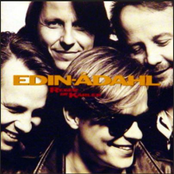Reser Till Kärlek

Biography
Swedish pop group that represented Sweden in the Eurovision Song Contest in 1990. See also: Frank Ådahl Ådahl Simon Ådahl Lars Edin Edin-Ådahl were a Swedish CCM group from 1980 to 1994, composed of brothers Bertil & Lasse Edin and Simon & Frank Ådahl. The group are most well known for their 1990 hit "Som en vind" (Like a Wind). It won the 1990 Melodifestivalen and went on to place sixteenth at the Eurovision Song Contest. The following year, they placed second in the Melodifestivalen. Simon Å...
Swedish pop group that represented Sweden in the Eurovision Song Contest in 1990.
See also:
Frank Ådahl
Ådahl
Simon Ådahl
Lars Edin
Edin-Ådahl were a Swedish CCM group from 1980 to 1994, composed of brothers Bertil & Lasse Edin and Simon & Frank Ådahl. The group are most well known for their 1990 hit "Som en vind" (Like a Wind). It won the 1990 Melodifestivalen and went on to place sixteenth at the Eurovision Song Contest. The following year, they placed second in the Melodifestivalen. Simon Ådahl participated in 1995 with together with Lasse Edin. Another song, "Revival", rose to #3 in Sweden's radio charts.[1]
Their English albums had similar production quality when compared to secular albums, but suffered from poor distribution and "lousy lyrics".[1]
Frank Ådahl was the voice of Simba in the Swedish version of the 1994 animated film The Lion King. Two of the brothers released solo albums on Refuge in 1985. Bertil Edin released Cross The Border, and Simon Ådahl I'm In Touch.[1] Lasse Edin formed a band called The Outsiders in 1990.
Eurovision Song Contest 1990 - Zagreb
Entry for Sweden
Performer: Edin-Ådahl
Song title: Som En Vind
Song writer(s):
Song composer(s): Mikael Wendt
Sang in Position: 18
Final Position: 16
Total Points: 24
The present Croatian capital of Zagreb was the choice of Yugoslavia's broadcaster JRT as host city for the 1990 Eurovision Song Contest. 22 countries participated in the 1990 Eurovision Song Contest, the same ones as in 1989. Many of the songs were about the political changes in Europe like the fall of the Iron Curtain and a united Europe. Norway's song Brandenburger Tor and Austria's Keine Mauern Mehr reflected the German re-unification topic.
The Spanish performance was plagued by technical problems. First the backing track failed to play, then it was started too early. The delegation's conductor completely lost control and the Spanish duo, Azúcar Moreno, left the stage. The second attempt was successful and the duo ended up in fifth place.
The Belgian entrant, Philippe Lafontaine, reached the 12th place with his song Macédomienne. Afterwards, he refused to release the CD as the song was a love token for his Macedonian wife, however he did release it years later to help a refugee project in Bosnia & Herzegovina. Eurovision veteran, Serge Gainsbourg, wrote the French entry White And Black Blues performed by Joelle Ursull which was a spectacular multicultural song with lots of African drumming. It ended up sharing the second place with Ireland.
The well-known Italian singer Toto Cutugno won this year's song contest with the song Insieme: 1992 which was about a united Europe in anticipation of the completion of the European Single Market, due at the end of 1992. Both the French and the Italian songs went on to be big hits in Europe and were played all summer long. Even nowadays, both songs are regarded as Eurovision evergreens.
Read more on Last.fm. User-contributed text is available under the Creative Commons By-SA License; additional terms may apply.

